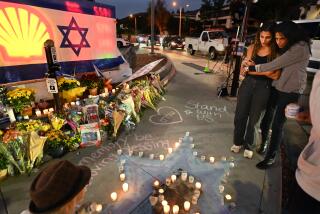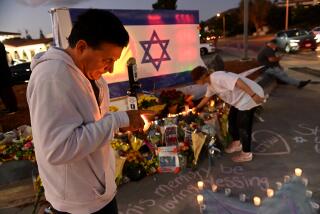Iraq veteran’s slaying mystifies a D.C. suburb
- Share via
ARLINGTON, VA. — It has been four months since Paul Zeller, 24, was gunned down within walking distance of the Pentagon, and there is no suspect in sight. He had survived a hard year as a soldier in Iraq only to die in a clean, well-lighted place in suburban America.
Frustrated by the lack of progress in the investigation, relatives and friends have passed out hundreds of fliers and established a reward of more than $3,000 to pry out information that might lead to an arrest.
Each time they return with a new stack of fliers to the busy stretch of malls and high-rise apartments that Zeller passed moments before he was slain June 30, they wonder how the crime has remained unsolved for so long.
“It’s so close to where such a large number of people live,” said Navy Cmdr. Lydia Robertson, Zeller’s sister, who lives less than a mile from the scene. “I’m disappointed that there hasn’t been more of a response from people in that area. Maybe they were in bed, but with all the high-rises overhead, someone had to hear and see something.”
For Arlington, a prosperous Washington, D.C., suburb overrun each day by thousands of military personnel and government workers, Zeller’s slaying was more than just a cruel irony visited on a safely returned soldier and his family.
The Department of Defense does not keep figures on the number of Iraq veterans victimized by violent crime around the nation. But in Arlington, where homicides rarely surpass four or five a year, Zeller’s death also remains unusual because of both its setting and the weapon reportedly used to kill him.
“It’s sad enough that such a thing would happen to someone who made it back from Iraq,” said Robert Cresanti, a neighbor and senior official in the Commerce Department. “But this is one of the nicest neighborhoods in the D.C. area. There have to be a thousand windows above where he was shot. Somebody should have seen something.”
Arlington Police spokesman John Lisle would not comment on the type of weapon used, but those familiar with the case said Zeller was slain at close range with a shotgun, a weapon that Lisle confirmed had rarely been used in recent slayings and shootings investigated by the department. There is no clear evidence of a robbery, Lisle said, and police don’t know whether Zeller was targeted or a random victim.
Zeller was gunned down as he returned late from his job on the other side of the nation’s capital, working as a car detailer and salesman at a Honda dealership in College Park, Md. He had taken the subway to the Pentagon City station and had begun walking home through the Pentagon Row shopping area, an expanse of apartment houses, shops and restaurants.
Although it was just after midnight, “there were a lot of people in the vicinity and close by when it happened,” Lisle said.
Witnesses described a deafening blast. Zeller’s body was discovered at 12:06 a.m. near a market. He suffered multiple wounds to his upper body.
“We’re pretty confident we’ve talked to everyone who was willing to share information,” Lisle said. “We’re hoping now we can draw out people who have any information they may be reluctant to share because they’re nervous or they think it’s insignificant.”
Robertson said she could not imagine her brother had been targeted. Despite his military service, she said, “he was not an aggressive person. He was not someone with a chip on his shoulder. He was the kind of easygoing guy who would crack up at his own jokes.”
Zeller was the youngest in a strong military family from Westcliffe, Colo., a town of 400 residents about 90 miles southwest of Colorado Springs. Zeller’s grandfather served in the Army, his father was a Navy chaplain, and two brothers were in the Air Force and the Colorado Army National Guard.
Zeller joined the Army after the Sept. 11 attacks and went to Iraq with the 82nd Airborne Division as an artilleryman assigned to a mortar unit. “He had some scary and tough times,” said Robertson, who said her brother spoke only tersely about his time in Iraq. “He had a few life-threatening moments, some close calls at checkpoints.”
He was discharged in September 2004 and moved in with Robertson and her husband, a Marine who has also served in Iraq.
More to Read
Sign up for Essential California
The most important California stories and recommendations in your inbox every morning.
You may occasionally receive promotional content from the Los Angeles Times.












